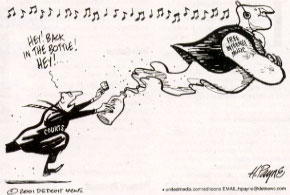|
  Unless your name is Rip van Winkle, no doubt that
you have heard of Napster. You know, that gangster web site that
facilitated trading MP3 files. Wait . . . did I say gangster? Maybe I
meant to say "revolutionary." Yes, there is a revolution, a
technological and economic revolution. Napster may simply be the
victim of an industry that has not kept pace with technological
advances or the demands of the consumer. Unless your name is Rip van Winkle, no doubt that
you have heard of Napster. You know, that gangster web site that
facilitated trading MP3 files. Wait . . . did I say gangster? Maybe I
meant to say "revolutionary." Yes, there is a revolution, a
technological and economic revolution. Napster may simply be the
victim of an industry that has not kept pace with technological
advances or the demands of the consumer.
There are clearly opposing views of the Napster
situation. On one hand, the copyright laws clearly prohibit copying
and distributing MP3 files by Napster users.
Napster users are not shielded by the fair use
doctrine and, by providing a web site that facilitated trading MP3
files, Napster encouraged and assisted with copyright infringement.
Judge Marilyn Patel of the Northern District said so, and the Ninth
Circuit agreed. As a result, Napster has been enjoined from allowing
unrestricted file sharing to take place. The injunction requires that
Napster prevent the downloading of songs that the owner (e.g., artist
or label) advises Napster that they want to be excluded from
downloading.
On the other hand, why should a consumer have to
purchase a high- priced CD which has one or two popular songs buried
among 10 or more songs that are dogs? Shouldn't a consumer be able
to pick and choose the songs that he or she wants, and only pay for
those? Few will probably disagree. But Napster users weren't paying
for the songs they were selecting; instead, they were engaging in
copyright infringement.
As technology advances, so may the needs or
desires of the users of that technology. Digital files such as MP3
audio files are easy to copy and easy to transmit. Napster was popular
because it was easy for users to link their computers and trade files.
If the music industry wants to protect against
unauthorized copying, then the files should be coded in a way that
deters copying. However, even the most sophisticated copy protection
schemes won't completely stop copying, so a further deterrent is
needed. Namely, there should be an economic incentive to purchase the
music rather than to copy the music.
Why not simply lower the price, and not force the
consumer to buy songs they don't want just so that they can get the
ones they want? After all, if legal copies can be obtained at a
reasonable price, the incentive to steal is reduced.
The Napster decision sends a clear message to
all: the copyright laws prohibit unauthorized reproduction and
distribution of protected works. But isn't the genie already out of
the bottle?
A quick search of the internet by the author
turned up dozens of Napster alternatives such as iMesh, SwapStation,
Audiognome, Upstage.com Musicians, MyNapster, Filenavigator,
ShareYourWorld.com, Gnutella, Spinfrenzy, and Swapoo. And the list
goes on and on.
With widespread use of the internet and the ease
of duplication of electronic files, can MP3 file sharing really be
stopped? What if the site is located outside the United States? Is
Napster but a hollow example of enforcement of the copyright laws?
Even if injunctions are issued against all of the
Napster-type sites, new sites will quickly emerge. Further, software
is available that permits peer-to-peer file transfers over the
internet without even having to use an intermediate site such as
Napster. The technology is just too easy and too widespread to shut
down completely.
Couple this with a generation of technologically
advanced individuals who don't even understand why the copyright
laws should apply to personal use, and you have a potential
revolution. Perhaps we are hearing a young and rebellious generation
voice their opinion that music is for everyone and its distribution
should not be so limited. Perhaps we are being told that the copyright
laws should be changed. Yes, the labels and artists should be fairly
compensated, but consumers need to be protected from unreasonable
pricing as well.
If the recording industry wants to keep pace with
technology and protect the rights of the artists and labels, then it
needs to take affirmative measures to prevent copying while, at the
same time, allow the consumer to purchase only the songs that he or
she wants at a reasonable price.
In turn, the consumer must respect the copyright
laws and not copy, or assist others with copying, music without the
authorization of the owner. Widespread defiance of the copyright laws,
such as is evidenced by the plethora of internet sites devoted to
sharing MP3 files, does not make the activity legal.
If a change in the copyright laws is desired,
there are legitimate ways that the framers of our Constitution have
provided to do so.
 John P.
O'Banion, a partner in O'Banion & Ritchey LLP in Sacramento,
is chair of the Intellectual Property Section of the State Bar of
California. He is a registered patent attorney and practices
exclusively in the area of intellectual property. John P.
O'Banion, a partner in O'Banion & Ritchey LLP in Sacramento,
is chair of the Intellectual Property Section of the State Bar of
California. He is a registered patent attorney and practices
exclusively in the area of intellectual property. |

